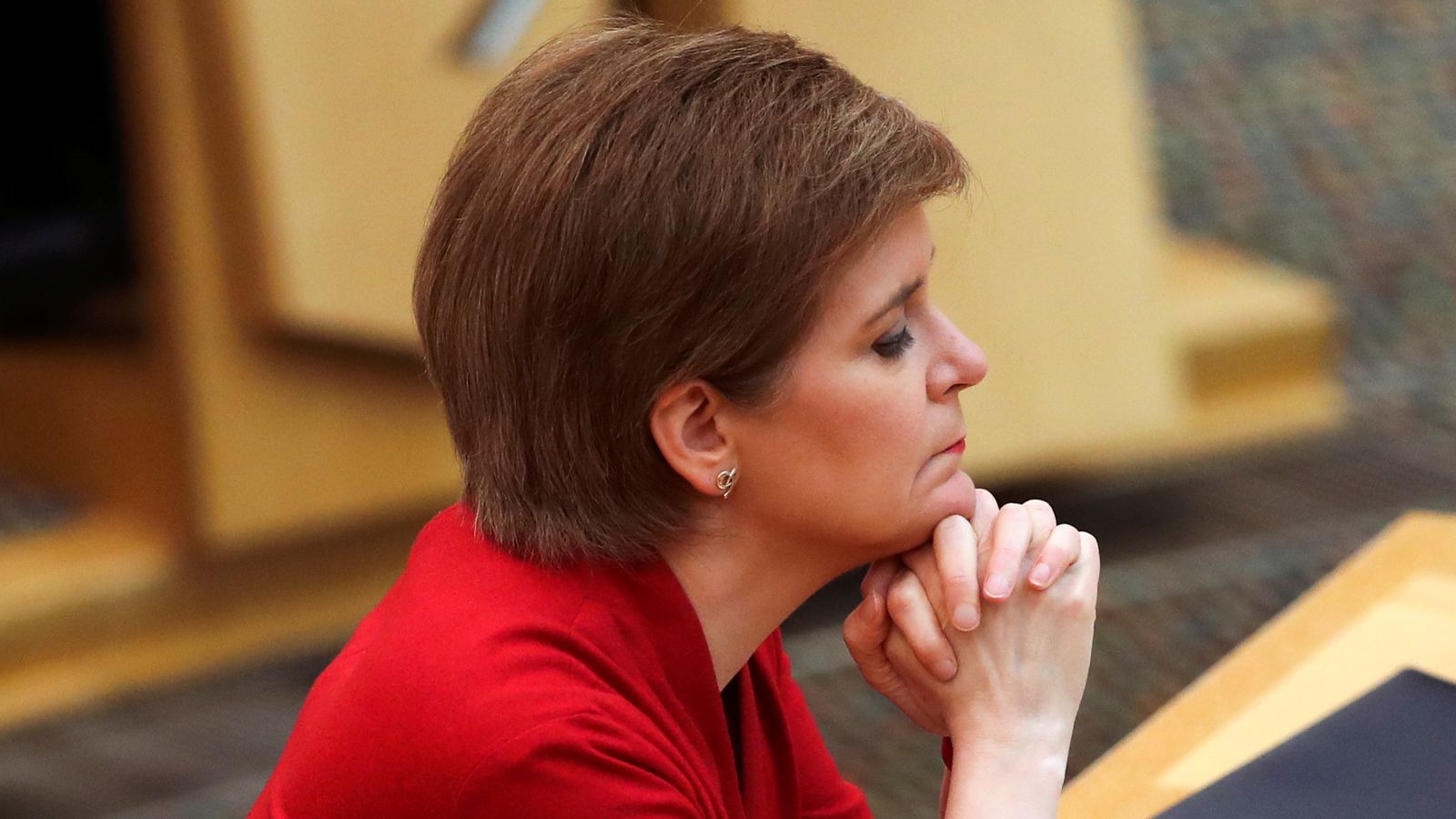The SNP have a 22-point lead in a new Scottish poll for Sky News, which would see Nicola Sturgeon remain first minister after the May elections but could deprive her party of an overall majority at Holyrood.
The exclusive Opinium poll of Scottish voters, taken this week, also reveals 51% of Scots would support independence – against 49% who say they would remain part of the United Kingdom.
Opinium found that when voters were asked about the upcoming Holyrood elections, the SNP would get 46% of the constituency vote, Conservatives 24%, Labour 20%, Lib Dems 6% and the Greens 4%.
When casting their second vote for a representative for the electoral region, the poll puts the SNP on 42%, Tories on 22%, Labour on 19%, the Greens on 7% and Lib Dems on 5%.
While still giving Ms Sturgeon’s SNP a clear lead, the 46% who say they would vote for the SNP in their local constituencies represents the lowest proportion for the party in any poll since the December 2019 general election.
Every poll of 2020 recorded the SNP share of the constituency vote above 50%, peaking at 58% in September and October, suggesting that the SNP’s recent troubles have dented their poll rating.
However polls from other companies are not directly comparable and Opinium has not conducted a Scottish poll since the 2019 general election.
The result of today’s Opinium poll would deliver a similar result to the one seen in 2016 in Holyrood.
Using a uniform swing calculator, a crude method to predict the number of seats using the percentage share of the vote, Opinium says that the poll results would mean the SNP gain one seat to 64 seats but still be one short of a majority.
The Tories would be down two to 29 seats, Labour unchanged on 24 seats and the Greens up one seat to seven.
Tiny differences could mean the difference over whether the SNP gets a majority, and their likely ability to forge an electoral pact with the Greens again means they would still have a majority for pursuing independence.
The poll found the slimmest of majorities in favour of independence, 51% in favour to 49% against once “don’t knows” are removed.
In 2014, Scotland rejected independence by a margin of 55-45.
There is significant division among Scots about whether there should be a referendum in the coming five years: 46% think there should be a referendum before 2026 but a bigger proportion, 47%, think there shouldn’t be if the SNP win an overall majority in May.
The poll found Ms Sturgeon is still highly popular in Scotland, with a 27-point approval rating, compared with Boris Johnson who gets a rating of -35 and Keir Starmer on -11.
Douglas Ross, the Tory leader in Scotland, is also in negative territory on -15, while Anas Sarwar, who was elected Labour leader this month, has a net approval score of 0.
The poll found that the results of the upcoming inquiries into the investigation into her predecessor Alex Salmond might pose dangers for Ms Sturgeon.
Some 40% think Ms Sturgeon was telling the truth in the recent hearings with her and Mr Salmond, compared with 44% who do not. Meanwhile, 15% think her accuser, Mr Salmond, is telling the truth, while 68% think he isn’t.
However, if she is found to have broken the ministerial code, 51% think Ms Sturgeon should resign, compared with 35% who think she should stay in her job.
Ms Sturgeon is nevertheless a lot more popular than Mr Salmond, with 58% having a favourable view of her, compared with 14% for her predecessor.
Most Scots with a view, 47%, still want to rejoin the EU, although this is lower than the proportion who voted to remain in 2016.
Of the remainder who have a view, 14% want a closer relationship than that currently negotiated, 12% think the current relationship is right, while 16% want a more distant relationship.
Opinium interviewed 1,096 Scottish adults online for Sky News from 11 to 16 March.






















